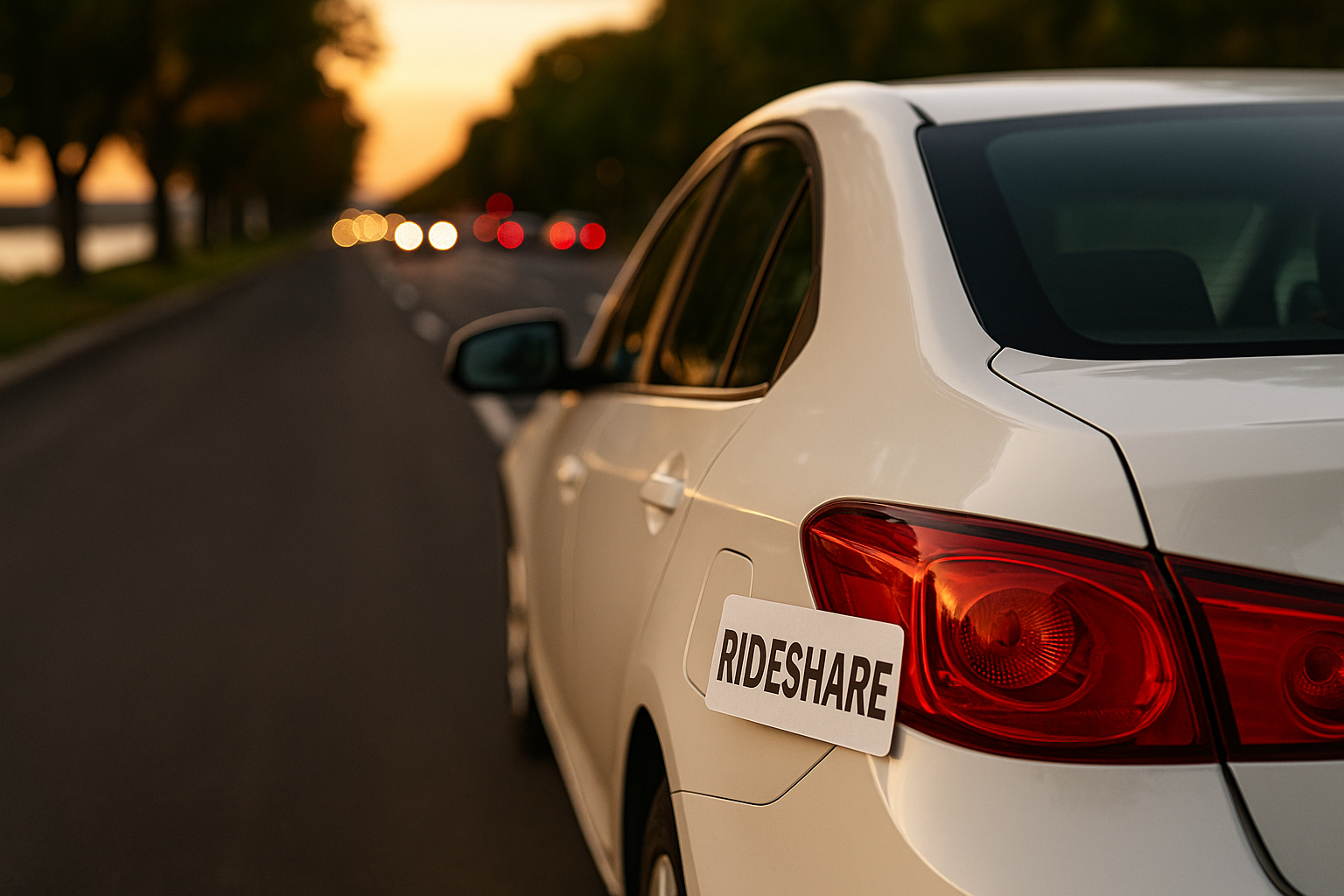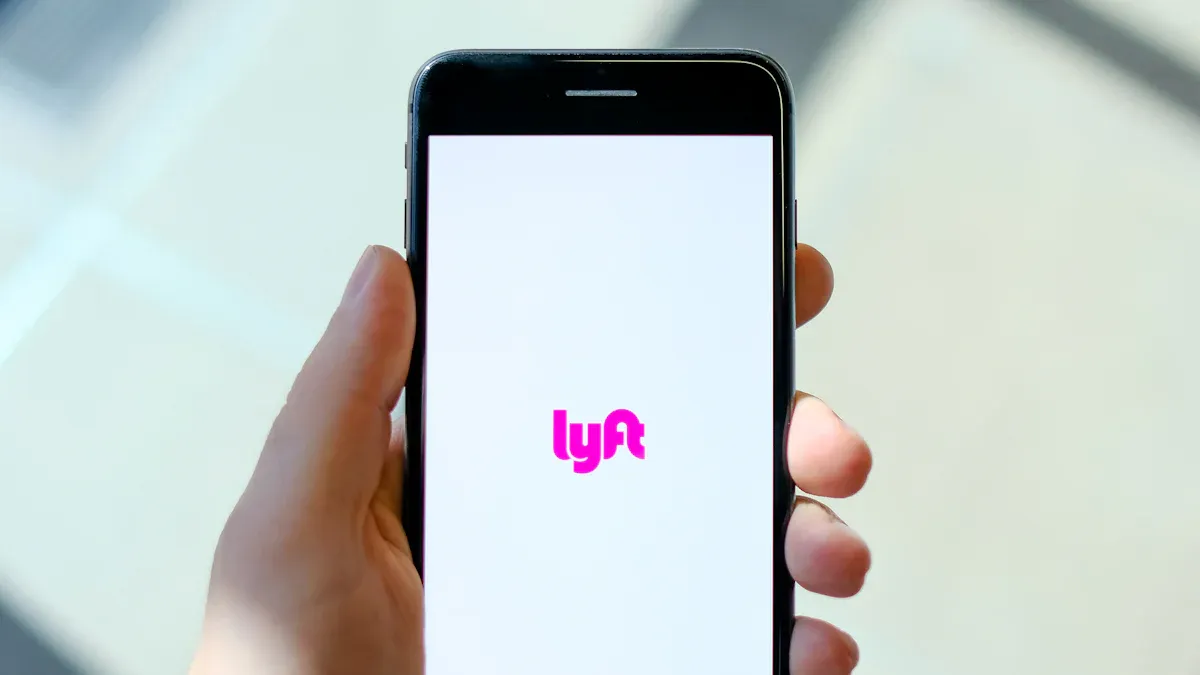
You drive for Uber in Bluffton. You accept a ride. Suddenly, you get into an accident. You wonder about rideshare & delivery? the gaps your app doesn’t tell you about. Your app says you are covered, but rideshare & delivery? the gaps your app doesn’t tell you about often remain hidden. You check your policy. Rideshare & delivery? the gaps your app doesn’t tell you about leave you stressed. You want peace of mind, but rideshare & delivery? the gaps your app doesn’t tell you about make things confusing.
Key Takeaways
Personal auto insurance usually does not cover rideshare or delivery driving. Look at your policy for things it does not cover. You should think about getting rideshare insurance for more protection.
Rideshare apps only give you a small amount of insurance. Learn how coverage changes when you wait, accept rides, and drive passengers. This helps you avoid money problems.
Check your insurance policy often to make sure it works for you as a rideshare or delivery driver. Keep up with local laws and insurance rules to keep your money safe.
Insurance Gaps in Rideshare & Delivery

When you drive for ride-sharing apps or delivery, you want to earn more money and bonuses. You might think your app or your own car insurance will protect you. But insurance gaps can leave you at risk for big money problems. Let’s talk about why these gaps are important and how they can affect your safety and peace of mind.
Insurance gaps happen when your personal auto policy and your ride-sharing app do not give enough coverage for accidents or damage. The National Association of Insurance Commissioners (NAIC) says most personal auto insurance does not cover ride-sharing or delivery driving. This means you could owe a lot of money if something bad happens while you work.
Personal Auto Policy Exclusions
Your personal auto insurance may look like it will help, but it often does not cover ride-sharing or delivery. Here are some common things you should know:
Personal auto insurance may not pay for accidents while you work for ride-sharing apps or delivery.
Most personal policies do not cover commercial use, so you pay for damages yourself.
Insurance may not cover business use, like food delivery or ride-sharing.
Many companies want you to have a commercial auto policy or rideshare insurance for coverage.
A personal auto policy is not enough for drivers with Uber, DoorDash, or similar jobs; you need extra coverage.
Think about driving in a busy area during high demand. You take a delivery order and then get into an accident. If your policy does not cover commercial use, you must pay for repairs and medical bills. This can take away your earnings and bonuses for a long time.
Tip: Always check your policy for rules about ride-sharing. If you do not know, ask your insurance advisor for help.
NAIC says you need rideshare insurance or a business-use add-on to fill these gaps. Without it, you could lose your financial protection.
App Coverage Limitations
Ride-sharing apps like Uber and Lyft give some insurance, but it has limits. Here is what you should know:
Most personal auto insurance does not cover ride-sharing. If you have an accident while driving for a ride-sharing app, your personal insurance may not pay for damages.
Ride-sharing apps do give some insurance, but you need to know the limits. Usually, the app’s insurance only works when you have a passenger or are delivering an order. There is a gap when you are logged in but have not accepted a ride or delivery.
Also, ride-sharing app insurance usually only pays for damage you cause to others. It does not pay for damage to your own car. That is when your personal auto policy would help.
Here is how ride-sharing app insurance works:
If you are off-duty (app off): Only your personal auto insurance works. Uber/Lyft do not cover you.
If you are online waiting for a ride: The ride-sharing company’s insurance has special limits.
If you are on a ride: Uber/Lyft’s $1 million third-party liability insurance covers you.
When you wait for requests, coverage gaps can leave you at risk. The app’s insurance during this time does not cover all types of damage. The liability limits are 50/100/25, which may not pay for everything in an accident. You must pay for any damages over these limits.
Tip: Do not think your app’s insurance covers everything. Read the details and ask questions about coverage gaps.
If you want to be safe and have peace of mind, you need rideshare insurance that covers all parts of ride-sharing. This protects your money and helps you avoid surprises.
[!TIP]
Add Rideshare Coverage Today
Protect your money and avoid coverage gaps. Get a quote from GSP Insurance Group for rideshare insurance that fits your needs.
The Period Problem
If you drive for Uber, Lyft, or a delivery app in Bluffton or Hilton Head, your insurance changes based on what you do in the app. Insurance companies and rideshare apps split your time into three periods. Each period has its own rules and risks.
Period 1: Waiting for Requests
You turn on your app and wait for a ride or delivery. You might think you are safe, but this is where many drivers have the biggest gap.
Rideshare companies only give a little liability coverage during this time.
Uber gives $50,000 for each person hurt, $100,000 for each accident, and $25,000 for property damage.
You do not get coverage for your own car if it gets damaged.
If you crash, your personal auto insurance usually does not help because you are working.
Picture yourself waiting outside a coffee shop for your next ride. Another car hits you. You might have to pay for your own car repairs.
Insurance gaps in Period 1 can make you pay for damages yourself. Your personal policy may say no, and the app’s insurance might not be enough.
Period 2: Matched, No Passenger
You accept a ride or delivery, but you have not picked up your passenger or food yet. Your coverage gets better here.
Uber and Lyft give $1 million in liability coverage.
You might get some collision and comprehensive coverage if your personal policy has it.
This coverage starts when you accept a request and ends when you pick up your passenger.
After you accept a ride, your protection goes up. You get $1 million in third-party liability insurance and sometimes uninsured motorist coverage. Even without a passenger, you have more protection.
Period 3: Passenger or Delivery Onboard
You now have a passenger in your car or food in your seat. This is when you get the most protection.
Coverage Type | Amount/Details |
|---|---|
Liability Insurance | $1 million liability insurance for injuries and property damage during Period 3. |
Uninsured/Underinsured Motorist | Protects you and your passengers if another driver does not have enough insurance. |
Contingent Comprehensive and Collision | You can get this if your personal policy has it, but you must pay a $1,000 deductible. |
If you crash while driving a tourist to Hilton Head, the app’s insurance helps you. But you still need the right personal policy to fill any gaps.
Insurance for rideshare and delivery drivers in South Carolina can be confusing. Each period has different risks. Knowing these facts helps you protect your side job and your peace of mind. GSP Insurance Group can help you find the right coverage for every part of your trip.
Rideshare Insurance Coverage Explained

What Rideshare Apps Cover
When you drive for Uber or Lyft, your insurance changes. It depends on what you are doing in the app. There are different times, like waiting for a ride, picking someone up, or driving them. Uber and Lyft give you special rideshare insurance for these times. You get some liability coverage while you wait for requests, but it is not much. When you accept a ride or have a passenger, your coverage gets bigger. You can get up to $1 million in liability insurance during a ride.
Let’s see how rideshare insurance is different from delivery apps:
Service | Notes | |
|---|---|---|
Uber/Lyft | Special coverage for certain times you drive | Good coverage during rides, but less when you wait. |
DoorDash | Only some liability coverage when food is in your car | No full insurance; drivers need their own coverage. |
Grubhub | No insurance coverage given | Drivers must get their own insurance. |
Instacart | No insurance coverage given | Drivers must get their own insurance. |
Uber and Lyft give you rideshare insurance when you drive people. Delivery apps like DoorDash only give some coverage when you have food in your car. Grubhub and Instacart do not give any insurance. You must use your own policy to stay safe.
Food Delivery Differences
You can see big differences between rideshare and delivery insurance. Rideshare companies usually give the same insurance to all drivers. Delivery apps are not the same. For example, Uber Eats gives you liability coverage like Uber rideshare. DoorDash gives $1 million in extra auto liability, but only when you deliver food. This does not pay for damage to your own car.
Here are some main points:
Rideshare companies give the same insurance, but delivery apps are different.
Uber Eats has the same insurance as Uber rideshare, but DoorDash only covers you when you deliver food.
Grubhub and Instacart do not give insurance, so you need your own rideshare insurance.
Personal auto policies do not cover driving-for-hire, so you need extra rideshare insurance.
Rideshare insurance add-ons can help cover food delivery too.
If you deliver food in Bluffton or Hilton Head, check your insurance. You may not have coverage unless you add rideshare insurance. If you do not have the right policy, you might have to pay for damages yourself.
Deductibles and Exclusions
You need to know about deductibles and exclusions before you drive for ride-sharing or delivery. Uber and Lyft have deductibles for collision coverage. You pay this amount before insurance helps fix your car. Uber’s deductible is $1,000. Lyft’s is more than $1,000. Some rideshare insurance policies have deductibles up to $2,500.
Type of Deductible | Amount |
|---|---|
Uber Collision | $1,000 |
Lyft Collision | More than $1,000 |
General Rideshare | $2,500 |
There are also exclusions in rideshare insurance. Personal auto insurance does not cover ride-sharing unless you add an extra policy. Rideshare insurance does not pay for personal things lost or broken in a crash. If you lose your phone or groceries in an accident, insurance does not pay for those.
Here are some important limits and exclusions:
Personal auto insurance does not cover ride-sharing or delivery unless you add rideshare insurance.
Rideshare insurance does not pay for personal things lost or broken in a crash.
In Phase 1, when you wait for rides, you only get a little liability protection. It is $50,000 for each person hurt, $100,000 for everyone hurt in one accident, and $30,000 for property damage.
If your personal insurance says no and rideshare insurance is not enough, you must pay yourself.
Without enough rideshare insurance, you might pay for car damage, medical bills, and legal costs.
[!TIP] Request a Quote Protect your money and avoid surprise bills. Get a rideshare insurance quote from GSP Insurance Group today.
You need to know what your rideshare insurance covers. You can avoid big bills and stress if you understand deductibles and exclusions. GSP Insurance Group can help you check your policy and find the best coverage for your ride-sharing or delivery job.
Local Risks: Bluffton & Hilton Head
Tourist and Seasonal Traffic
You drive in Bluffton or Hilton Head. During tourist season, more cars fill the roads. People visit for beaches, golf, and festivals. You get more ride requests and delivery orders. High demand helps you earn more money. But it also brings more risk. More traffic means more accidents can happen. You need to stay alert and protect yourself with the right Bluffton SC insurance.
Note: AAA says accident rates go up in busy vacation spots during peak travel months. You need coverage that fits local conditions.
Higher Accident Exposure
Busy roads in Hilton Head and Bluffton make accidents more likely. Tourists may not know the streets well. Drivers hurry to finish delivery jobs. You deal with stop-and-go traffic and quick lane changes. These risks mean strong Hilton Head insurance is important for gig drivers.
More cars lead to more small crashes.
Unfamiliar drivers make sudden moves.
Delivery rush hours add extra stress.
You want your side job to stay safe. You need insurance that covers you in every situation.
Local Laws and Insurance Needs
South Carolina has special rules for rideshare and delivery drivers. You must follow state laws and meet insurance needs. Some towns have extra rules for commercial drivers. Bluffton SC insurance and Hilton Head insurance policies help you stay legal and protected.
Requirement | What You Need |
|---|---|
State Minimum Coverage | Liability insurance |
Local Ordinances | Extra coverage for gig drivers |
Rideshare Endorsement | Fills gaps in standard policy |
You want peace of mind. GSP Insurance Group knows local laws and can help you pick the right coverage. You get a partner for your journey, not just a policy.
Ready to protect your gig? Contact GSP Insurance Group for a personal review and keep your earnings safe all year.
Rideshare Insurance: The Affordable Fix
Rideshare Endorsements
You want to keep your gig money safe and not spend too much. Rideshare endorsements are a cheap way to fix insurance gaps. These endorsements add more rideshare insurance to your own car policy. You get help in every part of driving, from waiting for a ride to dropping someone off. If you do not have this coverage, your claims might get denied or your policy could be canceled. Many drivers see that rideshare endorsements cost less than a full commercial policy.
Rideshare endorsements fill the space between personal and company insurance.
You get help if you have an accident while working for Uber, Lyft, or delivery apps.
You avoid losing money if something bad happens on the road.
Reviewing Your Policy
You should check your insurance before you start driving for a rideshare or delivery job. Look at your uninsured and underinsured motorist limits. Make sure you have enough help for every problem. Call your insurance company and ask about extra rideshare insurance. Tell your insurer that you drive for a rideshare company. Some companies need special coverage to keep your policy working.
Read news from Uber, Lyft, or your delivery app.
Ask your agent about any insurance gaps.
Keep rideshare coverage if your company says you need it.
Staying Updated
You should look at your insurance every few months. If you change how you drive, your insurance needs may change too. Staying up to date helps you find new risks and avoid problems. GSP Insurance Group can help you look at choices and keep your policy right.
[!TIP] Protect Your Gig Income — Get Covered GSP Insurance Group knows rideshare and delivery insurance. Get a personal review and find the best extra rideshare insurance for your needs.
Don’t wait until you have an accident to check your coverage. If you miss insurance gaps, you could have problems like:
Paying for your own medical bills
Paying lawyers if someone sues you
Your car insurance saying no to your claim
If you manage your insurance early, you can feel calm. Talk to GSP Insurance Group. They can help you stay safe while you drive.
FAQ
What is rideshare insurance, and why do you need it?
Rideshare insurance fills the gaps your car policy leaves. You need it to stay safe when you drive for Uber, Lyft, or delivery apps in South Carolina.
Does your personal auto policy cover delivery driving?
Most personal auto policies do not cover delivery driving. If you do not add rideshare insurance or endorsements, your claims may get denied.
How can you get the right coverage for gig driving in Bluffton or Hilton Head?
You can talk to GSP Insurance Group for help. Their team finds rideshare insurance that fits your needs and protects your money.
Ready to protect your journey?
GSP Insurance Group is your partner for rideshare insurance South Carolina. Get your coverage check today! 🚗
